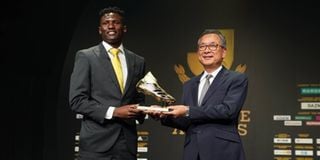History-boy Michael Olunga named J-League MVP

Kashiwa Reysol's Kenyan striker Michael Olunga (left) receives his J-League Golden Boot Award on December 22, 2020.
What you need to know:
- Olunga scored 28 goals and made four assists in his first full season in J1 League.
History making Kenyan international striker Michael Olunga was on Tuesday named the 2020 Meiji Yasuda Life J-League Most Valuable Player.
Olunga, who also claimed the Golden Boot award in the gala, became the league’s first African MVP and the eighth player to claim that award as well as the Golden Boot in the same season.
He is also the second foreign player to emerge the MVP after Leandro Domingues, who incidentally is the only other Kashiwa Reysol player to win this award.
Olunga scored 28 goals and made four assists in his first full season in J1 League. He accounted for nearly half of Reysol’s 60 goals this season, was the highest in the league since the 33 Araujo scored for Gamba Osaka in 2005.
Joining Olunga in the Best XI were Kashima Antlers’ Brazilian striker Everaldo — who scored the J1’s second-highest tally of 18 goals — as well as nine players from league champion Kawasaki Frontale, adding another line to the list of records shattered by manager Toru Oniki’s men this season.
Twenty-six-year-old Olunga, who is known by his nickname as The Engineer, credited Reysol for sticking with him after a slow start following his arrival in August 2018.
Following the club’s relegation that season, he notched 27 goals in 2019 to help Reysol clinch the J2-League under returning manager Nelsinho Baptista and swiftly return to the top flight.
“(Relegation) was really frustrating and depressing. But I knew I had a lot of responsibility on my shoulders, because the people of Kashiwa trusted me with the responsibility and I decided to fight for the team,” Olunga said.
“I’ve tried to acclimatise with the weather, I’ve tried to get to know the Japanese way of playing and I’ve been able to form a good relationship with the teammates. I believe a combination of these factors has led to my success, both in the J2 and J1.”
The former Tusker FC, Thika United and Gor Mahia striker praised Nelsinho, whose first stint with Kashiwa from 2009 to 2014 resulted in some of the club’s greatest successes, including the 2011 J1 title and the following year’s Emperor’s Cup crown.
“He’s a demanding coach in terms of results. He always wants victory, whether it’s a friendly, a league game, a cup game. And victory doesn’t come without hard work,” Olunga said. “The best thing he implemented is the hard-working mentality in the players."
“For him, trusting me to lead the line to get the goals, I feel responsible to try to repay his faith and the only way I can do that is by scoring a lot of goals so the team can do better.”
Olunga said he hoped to continue to be a positive influence in both Japan and Kenya, adding that he hoped other African players would join him in “the best league in Asia.”
“Coming here to compete with the best Japanese players, it’s really impressive because you see the hard work in the players. They have good mobility, they have good positioning, they are very hard working,” Olunga said.
Kawasaki’s contribution to the Best XI consisted of goalkeeper Jung Sung-ryong; defenders Jesiel, Shogo Taniguchi, Kyohei Noborizato and Miki Yamane; and midfielders Akihiro Ienaga, Ao Tanaka, Kaoru Mitoma and Hidemasa Morita.
The 23-year-old Mitoma, who scored 13 goals and led with 12 assists in his rookie season, received the most Best XI votes from his fellow players and coaches with 238 — narrowly edging out Olunga, who had 225.
“It’s an honor to be selected with so many good players nominated. I’m grateful to everyone who voted for me,” Mitoma said. “I wasn’t aiming for MVP … but of course I would have been happy if I was selected. I think Olunga deserved the award."
The award ceremony, which has traditionally been held with fans in attendance at Yokohama Arena or other large venues in the Tokyo area, was recorded ahead of Tuesday night’s broadcast with a limited number of participants to reduce the risk of infection.
Additional reporting by The Japan Times





